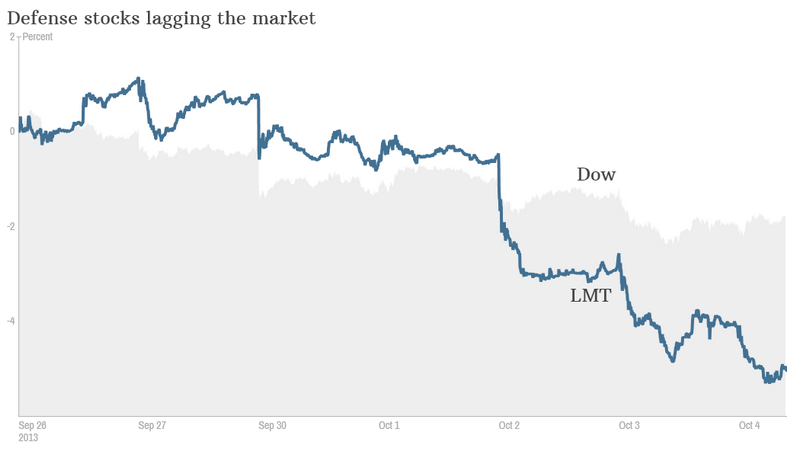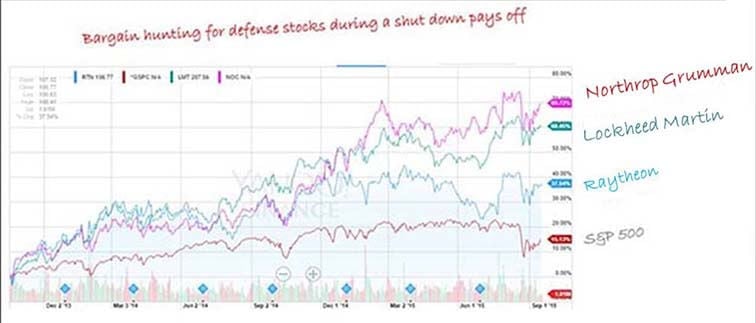Sigh... we stand yet again on the verge of another government shutdown. This time the bickering centers on funding related to Planned Parenthood, which has been linked to the appalling sales of fetal body parts in recent months, while other legislators insist on a planned multibillion dollar tax hike for private equity managers.
What could possibly go wrong - other than everything?!
The way I see it, wingnuts on both sides of the aisle are playing chicken with an $18 trillion economy and world markets once again.
Still, the investor in me is excited by the prospect.
The last government shutdown, as costly and embarrassing as it was, created some quick double-digit profit opportunities for savvy investors.
This one will, too.
But only if you're prepared ahead of time using one of our favorite Total Wealth Tactics - the lowball order - and only if you're looking at the best companies in this sector.
Congress Caused a $24 Billion Fumble in 2013 and Savvy Investors Banked Double-Digit Gains Anyway
The October 2013 government shutdown came with a $24 billion price tag, according to Standard & Poor's, as hundreds of thousands of furloughed workers took home smaller paychecks and small businesses were hobbled by frozen government contracts and payments. Consumer confidence went into the proverbial toilet, and quarterly GDP growth fell from 3% to a middling 2.4%.
Not surprisingly, mainstream investors were spooked by headlines highlighting the unfolding doom associated with Washington's incompetence. Nowhere was that more clearly defined than in defense stocks, with some of the bigger players losing up to 7% of their market capitalization in just three days.
As usual, though, the herd failed to grasp something we talk about all the time.
Companies tapped into Unstoppable Trends making "must have" products tend to have the strongest fundamentals, the best balance sheets, and, more importantly, plenty of staying power. Any short-term price drop is, therefore, a fabulous buying opportunity under the circumstances.
Consider what happened to Lockheed Martin Corp. (NYSE: LMT) in late September and early October as the last shutdown became inevitable:

Click to Enlarge
Source: CNN.com
Raytheon Co. (NYSE: RTN) and Lockheed Martin were in the same boat. Both fell approximately 6% on the news of the shutdown, shedding tens of billions of dollars in market capitalization as they tumbled. Northrop Grumman Corp. (NYSE: NOC), United Technologies Corp. (NYSE: UTX), and General Dynamics (NYSE: GD) are just a few of the others that lost more than the broader markets back then.
But here's the thing - each of those companies came roaring back, and investors who swooped in to buy them at a steep discount as recommended have had the opportunity to more than triple the S&P 500 since our government reopened on Oct. 17, 2013.

Click to Enlarge
Now, obviously there are no guarantees. You cannot simply buy any stock that's cheap or in a decline - most are simply junk at a lower price.
But companies like the ones we're talking about are high-quality players tapped into the biggest of all of our Unstoppable Trends - War, Terrorism, and Ugliness. That means they've got trillions of dollars driving them and gobs of upside potential ahead. Short-term market movements are nothing more than noise for them.
The best way to play this situation is to use one of our favorite Total Wealth Tactics...
If you've never heard the term before, a "lowball order" is one of the simplest, yet most powerful orders available today, especially in volatile market conditions like we have right now.
They're great for at least three powerful reasons:
- You can place them in advance.
- You don't have to be at your computer to actively manage your money.
- You control your risk by waiting to make your move until the stock you want to buy meets YOUR risk reward criteria.
Here's how a lowball order works.
First, you line up with one of the six Unstoppable Trends we're following - Medicine; Technology; Demographics; Scarcity & Allocation; Energy; or, in this case, War, Terrorism and Ugliness.
Second, you select a stock that's been beaten down or is otherwise out of line with long-term expectations, fundamentals, and earnings potential. Ideally, this isn't just any old stock. It's one that you'd buy if it ever went "on sale." Great examples include Netflix Inc. (Nasdaq: NFLX) at $60, Apple Inc. (Nasdaq: AAPL) at $75, Gilead Sciences Inc. (Nasdaq: GILD) at $70, or even Alibaba Group Holding Ltd. (NYSE: BABA) at $45. Your list may differ, but my point is that you have a list... at all times.
Third, you pick a price - to the penny - that matches your individual risk tolerance, your investment objectives, and your belief about what the company is really worth. You can do that using fundamental measures like the "price to book" or intrinsic valuations, a la Graham and Dodd.
Or, you can also simply pick a technical point at which there is logical "support," or even previous lows depending on your time frame. There's no hard-and-fast rule here, but many traders find 10% to 15% below recent 30-day lows to be fertile hunting in choppy markets. To really stack the odds in your favor, though, you want to pick a price so low that others tell you that it's impossible for XYZ to trade at that level.
Fourth, you place your order to buy "XYZ at $___ per share or less, GTC" - meaning good till canceled.
Then, you sit back and wait for a price dip. In this case, it's more financial buffoonery from Congress and a corresponding knee-jerk reaction from uninformed investors who don't understand what we're talking about today.
Here are three companies to get you started.
You'll note they're all defense contractors for one simple reason - the Pentagon will never hold a bake sale to fund their programs, especially with the world's geopolitical situation the way it is. That zinger is courtesy of my editor, John Persinos.
Government Shutdown Lowball No. 1: Boeing Co. (NYSE: BA)
Based in Chicago, Ill., Boeing Co. (NYSE: BA) is a $93.8 billion defense company that has clients and operations in 150 companies as of 2015. As the world's largest aerospace company, it specializes in both military and commercial aircraft, satellites, electronic and defense systems, and advanced information and communication systems. Its most recent earnings report for Q2 2015 showed earnings from operations up 11% year over year - unsurprising considering the continued demand for aircraft in a global rearmament trend led by the United States, Russia, China, and Saudi Arabia.
I particularly like the company's proven ability (and desire) to raise dividend payouts aggressively over time. The company has hiked its dividend five times in the last seven years, going from a $0.40/share payout to $0.90/share - a 127% increase that's all the more impressive considering it took place during some of the worst financial conditions the world has ever seen.
BA dropped around 4% during the last shutdown, which suggests buying at $131.95 is a good place to go shopping. However, that's not quite a steep enough discount for me. Considering that lowball orders are meant to be serious discounts and placed at prices so low others deem them impossible, I'd be more inclined to start buying around $120 to $125 per share where there's strong support dating back to January 2014.
Government Shutdown Lowball No. 2: Lockheed Martin Corp. (NYSE: LMT)
Headquartered in Bethesda, Md., Lockheed Martin is a $64.7 billion defense company that's a global leader in defense, security, and aerospace technology. In a promising sign of expansion, the company has begun investing heavily in alternate energy exploration, including compact nuclear fusion.
With a price/earnings (PE) ratio of just 18.5 today, LMT is cheap for its industry - and will be an even better bargain if it sees anything like the 7% decline it suffered during 2013's shutdown. But, again, to really nail the spirit of lowball orders, I believe $185/share would really be great if you can get it.
Government Shutdown Lowball No. 3: Raytheon Co. (NYSE: RTN)
[mmpazkzone name="in-story" network="9794" site="307044" id="137008" type="4"]
I'd be remiss not to point out your opportunity to scoop up discounted shares of one of Money Map Report's best performers. Currently trading at around $107/share, RTN boasts a PE ratio of just 15.5 - almost a 40% discount from the industry average, according to Yahoo!Finance. That means that this $32.6 billion defense contractor is already extremely cheap - and a shutdown-induced dip could make it even more of a screaming buy.
Like Boeing, RTN is a dividend star, having raised its payouts seven times in the last seven years. But its payout has grown at a rate that surpasses Boeing's, at 141% growth in the same time frame. Even better, its payout ratio is a mere 36% according to Yahoo!Finance. That suggests there's plenty of room to climb higher.
A quick look at the chart tells me that there's support around $91 a share dating back to last August.
As always, if you fill any of these orders, I want you to do two things straight away: 1) smile knowing you swooped in at a huge discount to what other investors are paying today; and 2) immediately implement a trailing stop that's 25% below your purchase price to protect your capital and your profits.
In closing, financial buffoonery has been a part of government since the dawn of time, and another shutdown is par for the course.
This time around, though, you'll be prepared even if the government isn't.
Follow us on Twitter @moneymorning.
Editor's Note: The government shutdown could be a stunning opportunity to outperform the market by a factor of five or more - but it's not the main investing event on Keith's radar. His very first recommendation to Total Wealth readers doubled within six weeks of his bringing it to their attention and posted 35% gains within 11 months even as the markets dipped in the same time frame. Keith still sees more doubles on the horizon for the little robotics company that's set to conquer an Unstoppable Trend in human augmentation, so the time to move is now. For a full and free report on the company, including ticker symbol, click here to sign up for Total Wealth - it's free!
About the Author
Keith is a seasoned market analyst and professional trader with more than 37 years of global experience. He is one of very few experts to correctly see both the dot.bomb crisis and the ongoing financial crisis coming ahead of time - and one of even fewer to help millions of investors around the world successfully navigate them both. Forbes hailed him as a "Market Visionary." He is a regular on FOX Business News and Yahoo! Finance, and his observations have been featured in Bloomberg, The Wall Street Journal, WIRED, and MarketWatch. Keith previously led The Money Map Report, Money Map's flagship newsletter, as Chief Investment Strategist, from 20007 to 2020. Keith holds a BS in management and finance from Skidmore College and an MS in international finance (with a focus on Japanese business science) from Chaminade University. He regularly travels the world in search of investment opportunities others don't yet see or understand.



